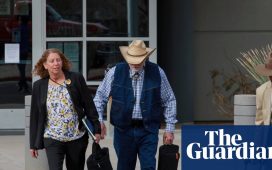Under a hot sun beating down on the US border, a family of five can be seen mid-river, struggling against a cruel current of greenish-grey water threatening to sweep them off their feet. It appears to be a couple and their three children, risking their lives in the treacherous Rio Grande that divides Mexico from Texas.
The father clutches a black backpack in his hand, the family’s only luggage. On his back he’s carrying a small boy wearing a rainbow-striped T-shirt. A little girl is on the woman’s back, small arms clasped tightly around her mother’s neck.
A third child, older and taller, in a red shirt, between the two adults, is up to his chest in the water and clutching their wrists. He’s battling to stay upright but the current surges and swirls and the parents are propping him up, trying to make sure he’s not whipped under.
The family were crossing on Sunday, trying to get to Eagle Pass, a small border town in Texas, east of San Antonio. The river bank on the American side is about 120ft across from the tiny town of Piedras Negras on the Mexican side.
Some miles downstream to the east, a picture was taken this week of a father and his tiny daughter from El Salvador who didn’t make it and drowned together, as the mother was waiting her turn to cross, too, from the Mexican side in Matamoros.
They were two of dozens who have drowned in the border river this year. Others, including toddlers, have been dragged from under the water by border agents and resuscitated.

The family wading from Piedras Negras are in mortal danger and don’t seem to be moving forward, as the current strengthens the closer they get to the US riverbank.
If they turn back, the Mexico’s immigration authorities will almost certainly deport them to whichever Central American country they have probably fled. The only way is forward, to try to seek asylum in the United States.
But as the Trump administration has flown in the face of human rights law, taking harsh measures to block people from crossing the border to seek asylum, many stranded in Mexico have taken to desperate measures.
It’s clear, even from the Mexican riverbank yards away, that the boy up to his chest in the river is scared. His father is now tugging on his arm, trying to drag the family on.
Three uniformed US border patrol agents on the Texas side are watching, and chatting, though not acting.
Minutes pass. The family has been in the water for over an hour. Then the agents fire up the loud engine on their boat, drive downstream, then head against the current towards the five. They instruct the family to move to a tiny island in the river, then grab the children and let the adults hoist themselves into the boat.
A government van is waiting and the agents offload the family and usher them into the van, disappearing in the direction of the Eagle Pass border patrol station, where they can expect to be detained as they become part of a clogged legal immigration system.

On the river bank back on the Mexican side in Piedras Negras, a small group of passersby has watched the crossing unfold. One man, Elodio Vergara Martínez, said he had just come back from church. He clutched the Book of Mormon with white knuckles, from the tension of watching the family dice with death.
“I always walk along the riverbank to and from church. Usually I look for crocodiles in the river. But I haven’t seen any. I guess that’s kind of lucky for this family,” Vergara Martínez told the Guardian.
He added: “The US agents really should have rescued them sooner. They were just trying to make that family suffer.”
The mayor of Piedras Negras, Claudio Bres Garza, a lifelong resident of the area, said in an interview with the Guardian on Tuesday that the level of migration through Mexico is unprecedented, especially involving stricken families from Central America.
“I saw the photos of the drowned father and his baby this morning. I’ve never seen anything like it. More than eight children have drowned in the river this year. It’s insane,” he said.
He added: “Nothing is going to change until Trump is no longer president. He’s just doing everything he can to win next year’s elections and thinking of his base. Trump knows that our economy depends on the United States. We know who has the upper hand here.”
Numbers of Mexican law enforcement officers have been increasing in recent days as Donald Trump demands that Mexico crack down on migrants before they attempt to cross the border. More than 200 Mexican federal police officers arrived in Piedras Negras on Saturday, reinforcing Mexican national guard soldiers and immigration agents already there. They guard the river and check people’s papers day and night.
On Sunday morning, a family of eight migrants from El Salvador arrived at the migrant shelter run by Catholic nuns in Piedras Negras. The Sánchez Reyes family of three adults and five children said they ran a bakery in San Salvador. But gangs began to extort them, eventually taking their house and business, forcing them to flee after killing a teenage niece.
“We aren’t against staying in Mexico. We want to find work here,” the matriarch, Flor Sánchez Reyes, said.
But those words may have been a decoy. Later that day, the Sánchez Reyes family slipped away from the shelter to “go for a walk and bathe in the river” after their six-hour bus ride from the Mexican interior, they told the Guardian by text message. It later emerged that apparently, as they approached the river, Mexico’s immigration agents stopped them and asked them for their documents, then detained them.
“If immigration agents caught them by the river then they will almost certainly be deported,” said Isabel Turcios, the nun in charge of the Casa del Migrante shelter in Piedras Negras.

Federal police officers stand out in the hot sun by the turbid waters for 12-hour shifts, with no shade, little water or food.
“We’ve been told to ask for identification from everybody, and especially from people who look like foreigners. This is exactly how it is where you come from,” one officer, who asked not to be named, said. “Yesterday we came across a drunk American without a valid visa. We took him to immigration detention and he’s going to be deported.”
Another said: “I know we are doing the work of the US border patrol. It makes me feel really sad. We have become Trump’s wall. But what can we do? We have our orders.
Claudia Hernández, a municipal police officer, said the “really kind of sneaky” migrants try to reach the river as the guards’ shifts change, around 8pm, when the officers are really tired.
“That’s when they make a break for the river. You would be surprised at how fast they can run. We can’t follow them into the river because it’s too dangerous,” she said.
She added: “The river is treacherous and people who aren’t from here don’t know that. I grew up here along the Río Bravo river [Río Grande]. I wouldn’t even go into that water to bathe or swim. There are springs and whirlpools and when the current takes you it can pull you under and you don’t resurface. I’ve been standing guard at the river for the last two months and it’s very sad to watch so many parents risking their lives with their children. It happens all the time.”
Meanwhile, Ángel Díaz, a migrant from Nicaragua, crossed the river with six family members, including his newborn daughter, around dusk on Sunday. The family had said they were going to stay for two days at the migrant shelter in Piedras Negras but instead disappeared late on Sunday afternoon. After several hours of not responding to messages, they got in touch, saying they had made it safely across the river to Eagle Pass.
“Nobody even stopped us as we got into the river. We changed out of our wet clothes and waited for ages on the riverbank. We wanted to turn ourselves in to border patrol,” Diaz said. “But the van never showed up so we decided to walk into Eagle Pass.”
They found a motel and threw themselves on the mercy of its owner, who said they could pay for a night’s stay in Mexican pesos.
“We are trying to figure out what to do,” Díaz said. “Do we turn ourselves in or try to keep going? We don’t have any money and so it’s going to be difficult to get out of Eagle Pass. Soon we’ll have to make a decision. I think we should turn ourselves in to border patrol.” It was hard to discern from WhatsApp messages whether the family was hopeful or frightened.
Back in Piedras Negras, there are simple wooden crosses in the municipal cemetery, marking paupers’ graves where unidentified migrants who drowned on the Mexican side of the river this year were taken to be buried.
Like the father and daughter photographed face down in the Rio Grande a few miles east, it is not possible to know exactly what terrors and prayers crossed their minds in their last seconds, but it is all too easy to imagine.






